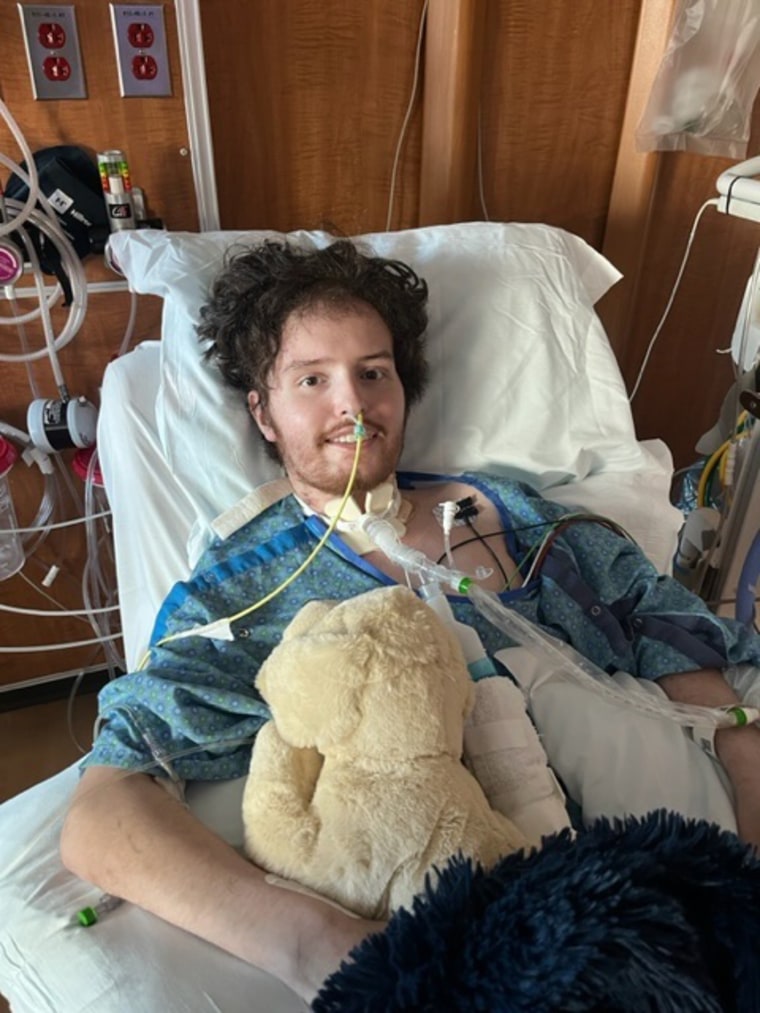A 22-year-old man received a double lung transplant earlier this month after being on life support for 70 days.
Jackson Allard, a North Dakota resident, went to the emergency room for a stomach ache in October, but was instead admitted to the hospital because his oxygen levels had dipped too low. The news was first reported by Valley News Live based on a GoFundMe page set up by an Allard’s family friend.
Doctors in North Dakota diagnosed Allard with parainfluenza, a virus that can cause respiratory infections, which spiraled into pneumonia, then acute respiratory distress syndrome — a life-threatening injury caused by fluid buildup in the lungs.
“When they did X-rays, you couldn’t even see his heart. It was all white. So that means the whole lung was full of fluid,” said Doreen Hurlburt, Allard’s grandmother.
Hurlburt said Allard had used e-cigarettes since he was 16 or 17, but recently started vaping more heavily.
“He had no idea how bad it was for him,” she said. “The day before he was intubated, he said, ‘I had no idea I could get this sick.’”

Scientists still don’t fully understand the association between vaping and lung disease, so it’s unclear what role vaping may have played in Allard’s case. Some studies suggest that using e-cigarettes could make people more susceptible to respiratory tract infections.
Dr. Brian Keller, medical director of the Massachusetts General Hospital Lung Transplantation Program, said studies involving animals and human cells have shown that e-cigarette use can damage blood vessels and cells that line the lungs. But scientists are still trying to narrow in on which compounds in e-cigarettes are the worst for human health.
“There’s actually several that can cause damage,” Keller said. “This includes the nicotine itself, but also the burning of a carrier fluid like propylene glycol or glycerol, as well as the flavoring that a lot of people add to their vaping device.”
Hurlburt said her grandson’s doctors suspected that his use of e-cigarettes prevented him from recovering from his initial viral infection.
“As he was not getting better, they’re like, ‘Well, he vaped and vaping hurts your lungs,’” she said.
Allard’s mother, Jaime Foertsch, said her son was placed on a life-support device called extracorporeal membrane oxygenation, or ECMO, then airlifted to M Health Fairview in Minnesota at the end of October.
Foertsch said Allard was the longest patient that M Health Fairview had ever kept on an ECMO machine, which adds oxygen to the blood and sends it back to the body. A hospital representative declined to comment on Monday, citing the Health Insurance Portability and Accountability Act (HIPAA), which safeguards patient privacy.
To be considered for a transplant, Allard needed to come off sedation and be able to walk. But at the end of last year, he was struggling to survive: Doctors had to replace parts of his ECMO device twice due to blood clots forming, which could have been fatal. Then on Dec. 12, he went into cardiac arrest and had to be resuscitated.
“In several family meetings the [Surgical Intensive Care Unit] team said there was a 1% chance of survival,” Foertsch said in an email. “We never gave up and kept advocating for Jackson.”

By the end of the month, Allard had improved and was able to stand and take a few steps, his family said.
“All of a sudden, it just turned around,” Hurlburt said. “It was just like day and night.”
On New Year’s Eve, Foertsch got the call that doctors had allocated a pair of new lungs to her son. Allard received a transplant the next day. By Jan. 5, he no longer required life support.
Allard is still on a ventilator in the ICU, his mother said, but he’s able to get in and out of bed with some help and walk about 5 feet with a walker.
“The nurses are calling him a legend and a miracle,” Foertsch said. “He is getting stronger every day and hopes he will be moved to rehab soon.”
Hurbult said her grandson still needs to re-learn how to talk, but he’s able to communicate.
“He thanked the nurses for all the help,” she said. “He just said, ‘Thanks for working so hard to save me.’ He’s a sweet kid.”
Lung transplants are relatively rare, and even rarer for people under age 50. Out of 2,569 lung transplants performed in the U.S. in 2021, just 440 were in recipients ages 18 to 49. Most vaping-related lung injuries don’t require a transplant, but patients typically need some type of respiratory support like supplemental oxygen or mechanical ventilation.
“I’ve only been able to come across a couple of reports of patients requiring lung transplant after vaping,” Keller said.
A 17-year-old boy in Michigan who received a transplant in 2019 is believed to be the first case. Last year, a 34-year-old man in Missouri also received a double lung transplant after developing a life-threatening lung infection that was resistant to antibiotics. The man had a history of smoking cigarettes and also vaped for nine years.
Around 54% of those who receive a lung transplant survive for at least five years after surgery.
Hurbult said Allard will need to spend around six months in Minneapolis so doctors can monitor his progress and make sure he’s tolerating the transplant. But his family anticipates a full recovery.
“He’s going to get his life back,” Hurbult said. “We’re going to get our Jackson back.”
